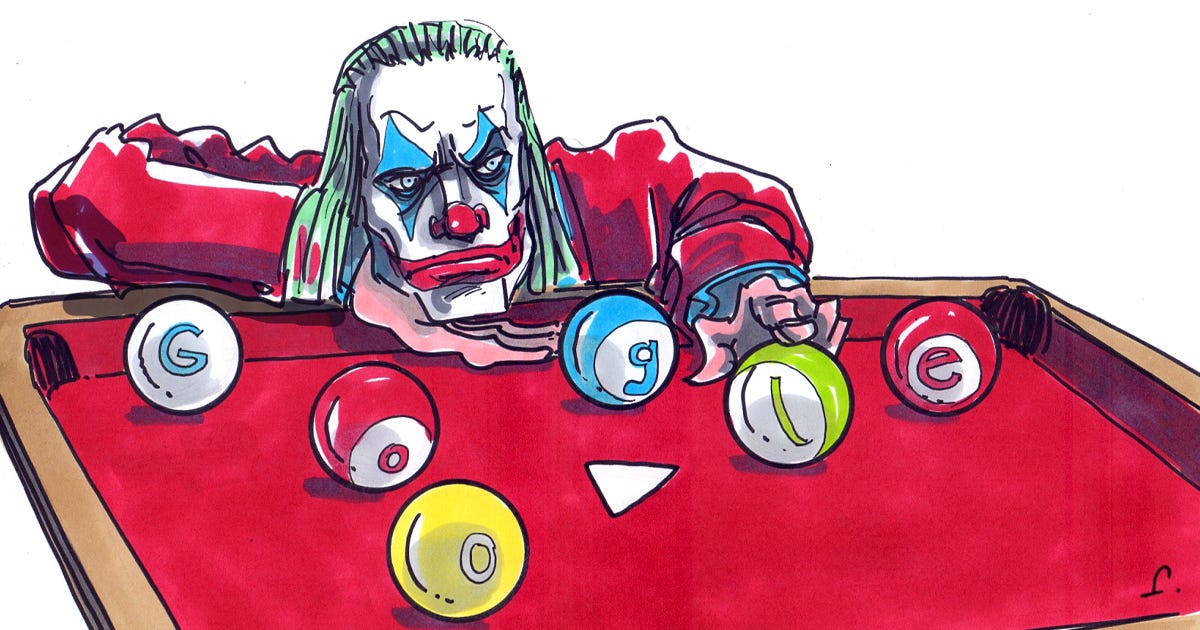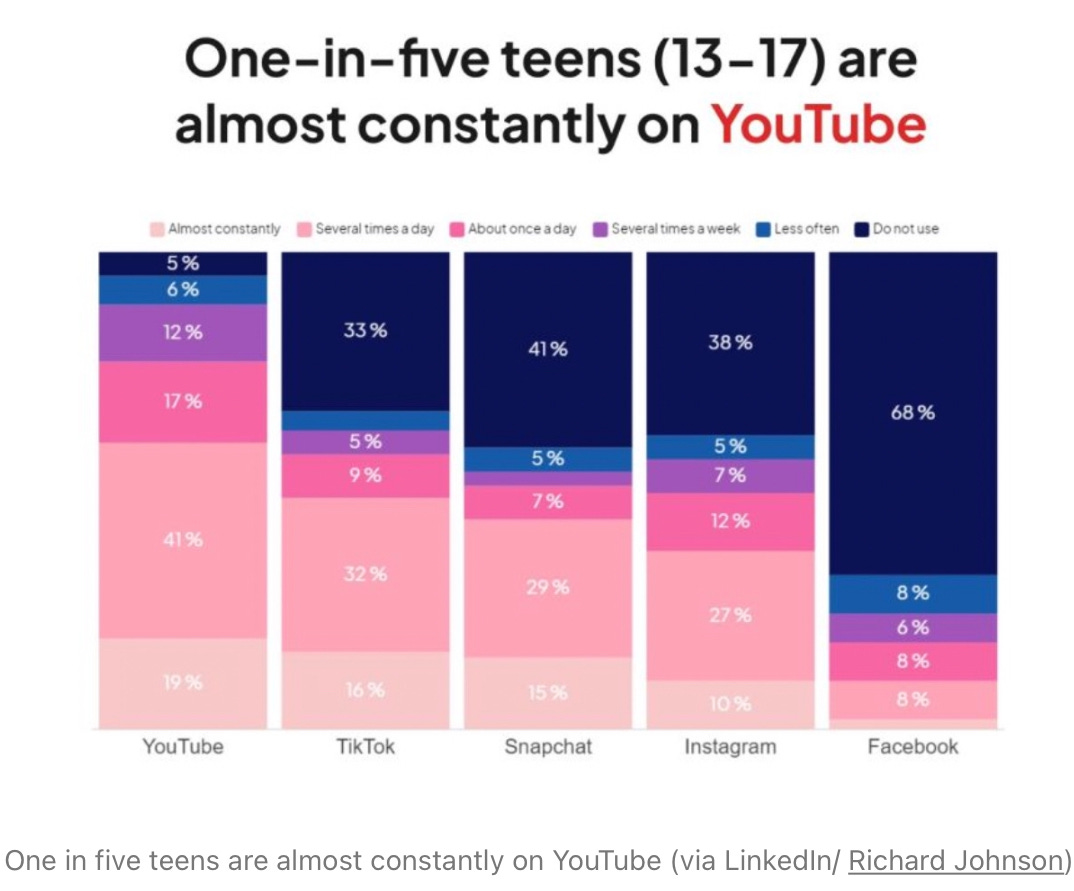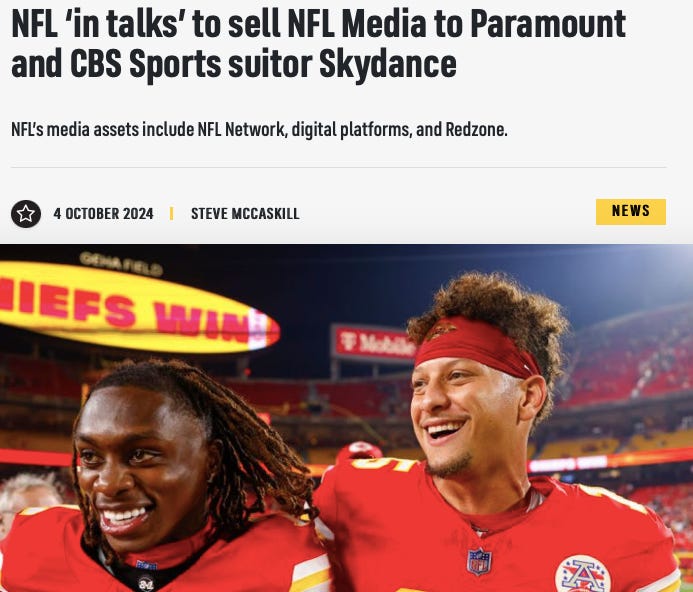Don't be Evil!
YT is the new content bundle, built with 2 advantages: it’s connected to the biggest search engine and maintains the most time spent per platform monthly on television.
The Albachiara Journal is an eclectic collection of our opinion and perspective, from our travels and encounters.
Zaz (David Zaslav), boss of Warner Bros Discovery, can’t catch a break.
We have often covered in these Columns how he is now really struggling. For a sport strategy post NBA, with tense carriage deals negotiations, VENU uncertainty, the debt, and basically trying to “turnaround” a failing company and share price.
But surely he could rest easy on the prospects of the “Joker“ sequel with Joachim Phoenix? A slam dunk (if Zaz still allows basketball analogies), based on the success of the first one.
Alas no.
The film has been an unmitigated disaster, both critically and financially, lampooned, and figuratively pelted with Rotten Tomatoes. For those that like the disaster genre, Hollywood insiders will explain to you in grotesque detail all the lay-ups (😉) missed in the script, casting and marketing of this film. Mamma mia, why would you go to Venice, killing any natural suspense and build-up in hype? Post-Italy, everyone knew weeks ago that this sequel was a true dog and destined to fail.
What has this got to do with a sportbiz Column?
Well… everything, really.
Warner Bros Discovery (WBD) is one of the biggest bidders for sports rights, so the bloodbath of “Joker Folie a’ Deux“ will ultimately cost our sector dearly, especially those hoping for interest in their rights from BT Sport, now called TNT. By now it should be clear that sport is simply a little boat being buffeted mercilessly by storms much much bigger than itself.
Hurricanes coming from America’s West Coast.
The existential travails at group level of the likes of Disney, Comcast, WBD, NBCUniversal, the regional sports networks, are exactly where we should all be now focusing our radar, if we want to manage sport well. Big Media has made our industry rich in the last 30 years, and if it catches a cold, our sector will get pneumonia.
It’s already got a fever, a sore throat and a runny nose!
Big Media itself is “in play”.
Financially and strategically, media conglomerates and broadcasters are flailing around as they fight the end of the cable bundle, being decimated by piracy and cut-the-cord. The industry is full of lay-offs, and salary cuts for talent. Because, frankly, younger customers don’t even know what the fucking cord is, and they ain’t paying for our subs.
The old model is done, and streaming isn’t so profitable, so cost-savings and consolidation is just inevitable. This Sportico article tells that tale.
Don’t forget that AT&T, buying DirectTV, was one of the most horrendously stupid acquisitions in corporate history. It was lauded at the time, because everyone is a genius in a bull market.
Sportico call it correctly.
Too late in the game.
All the important signposts for sport are now visible to us in California, either in Hollywood or Silicon Valley, and I often find myself looking over the pond, as…..
🎶the sun comes up over Santa Monica boulevard. 🎶
Any old excuse to enjoy the magnificent Ms Crow here.
This ain’t no disco, ain’t no country club either. This is LA, and it is our destiny.
All I wanna do this Sunday is ask the obvious question?
What is Big Tech going to do now?
Apple, Amazon, and especially Google.
It is today’s Column.
My generation is old enough to remember Larry and Sergey, founders of Google, and everything in that amazing story that led up to their IPO in 2004, exactly 20 years ago. Especially the Playboy article. Google it 😆!
It was a very different world. Some may even remember the West Wing episode when Josh Lyman tells Donna to “google” for some information, and this, for many, was exactly the moment when the company, now called Alphabet, won the browser wars.
If the President uses it, then I’m ditching Netscape, Mozilla, Microsoft and whatever else is out there. The cool kids use Google.
Google has grown to be “a monopoly”.
Very few will remember that the original company motto for Google was “Don’t be Evil”, a phrase in fact included in the IPO prospectus and the corporate code of conduct. Refresh your memory on that here,(wikipedia), because it shows how the world always changes, and the road to hell is often paved with good intentions.
Today Alphabet is, in fact, under the full court press (😉) of the law courts.
Google is a monopolist, and it has acted as one. – US District Judge Amit Mehta.
The “crime”, in plain English, is that they have used their leverage to buy exclusive distribution deals, making sure other browsers, like DuckDuckGo, are being actively kept out of competing. This is a big risk for Alphabet Inc and they will watch the US election in November with great interest, to imagine what can come next. Could a new administration take a different view on Big Tech?
This article gets Column readers fully up to speed.
Don’t be Evil seems rather quaint.
Something very similar happened to Microsoft a generation ago, as regulators made the same accusation, exactly at the time when it wasn’t even needed anymore. The market was changing so much, with the invention of the internet, that Microsoft was losing its monopoly naturally. I personally believe that this is also now true for Alphabet, with today’s intense market disruption in content, AI, distribution.
If I was a Google, I’d be more worried about ChatGPT.
The future of sport depends on this court case.
Hyperbole?
What happens in these courts, and the fall-out, is going to change absolutely everything, in search, in AI, in digital publishing, SEO agencies, platform distribution and, most importantly, content. That obviously includes sport, but more holistically than we think.
YouTube (YT) is a hot topic in sport these days, but people are missing the real action. Many of my colleagues are gushing about how sport needs to embrace YT, and celebrating the success stories. Good.
Many others are putting out excellent pieces on practical strategies for YT and sport, offering great advice. I’d like to specifically mention Paola Marinone, Paul MacDonald, Jo Redfern and Andy Marston as my go-to people on all this.
Here is a stunning summary Jo did for me. Some people are so generous.
There is absolutely no doubt on the virtue of sport (et al) using YT for return, to widen an audience, top of the funnel conversion of fans, awareness, etc. I’m not going to repeat, or compete with, my friends above, also because I don’t believe that this is actually the main macro issue.
This moment in time is much bigger than explaining to sport how to tactically use YT.
That is line-manager stuff mainly, and this publication has a CEO/investor audience also.
The big vision is really about ownership of the screen, discoverability, choice paralysis and the future of distribution. About which platform, or new cable bundle, is going to dominate sport delivery going forward, and how will all that impact future bidding for sports rights?
The real insight is in understanding the rationale behind YouTube TV, and how it will likely change everything. But we shall get to that product later. For now, we just need to realise something very very important.
YT is this generation’s search engine, and it is where kids already find absolutely everything in their day-to-day. Not just content, but “how-to” videos to get them through life, relationships, and the workplace.
Kids now live on YT.
My son is fifteen. He’s never going to sit down and watch live sport on a TV channel, because he doesn’t watch anything on a TV channel anymore. However, if it was streamed on YT, with the right kind of personality, he may be interested to do that.- Murray Barnett.
Sadly, most sports leagues and clubs don’t yet really get any of what Murray is saying so profoundly in this quote. They only see YT as an add-on, a little tactical jam on top of their main strategy of getting a big cheque for their rights, (broadcast and sponsorship).
Because, deep down, sport hasn’t changed one bit. It talks a lot, on endless podcasts and at conferences, but behaves exactly as it always has.
It is undeniably a slow “follower” in understanding and adopting tech, AI, and new distribution (like YT or Twitch), and still refuses to see that the big media rights bids and minimum guarantee days are ending. This is delusional denial, and/or ignorance.
The WSL example of YT success is great and we must congratulate them, but how much of all that was forced, because they could not get their renewed improved media deal with Sky away? And the FA Playeris rubbish.
Regardless of how sport arrives there, it needs to get up to speed, STAT, on what Google/YT now is.
The datapoints don’t lie.
1.
There were 35bn hours of sports content viewed in the last year on YT, up 45% on the previous year.
2.
The core of sports on YT is highlights. The majority of major sports leagues, bodies and broadcasters around the world now upload highlights immediately after matches, regularly generating 1m+ views per clip, with many monetising via ads. But let’s be very very clear: today, unless you are Mr Beast, you aren’t going to be making a lot of money out of YT ads. Not yet anyway!
It will come soon, as more of the TV media-buying budgets switch to content on platforms. But not today.
3.
Sport also uses the platform more and more for “shoulder content”: training footage, player interviews, press conferences etc, to increase fan engagement. Liverpool have 10m+ YT subscribers, and most EPLclubs have 1m+. Maybe not yet a big revenue driver, but social numbers help in selling sponsorships, in theory. Sadly, one of the big gaps at rights holders is that they don’t have the skills to sell digital sponsorships well. Ask Horizm.
YT today is marketing, awareness, and reach.
Swimming where the fish live, ideally using partnerships with influencers to get to these new audiences, to fill the top of the funnel. Not just for sports. For any message.
Alex Cooper, the host, comes from Barstool, and now is a major media influencer in her own right.
I am anything but a Kamala fan, but her use of “Call Her Daddy“ (I’m told by my daughter) has gone down so well, with extremely high engagement. The Donald is using exactly the same tactic with Joe Rogan and Theo Vonn. Some of the more immaginative football clubs, like AC Milan, are also now doing similar things with YT.
So are the smartest athletes. This article is instructive.
According to Two Circles, Gen Z are 74% more likely to be drawn to a sport by a certain individual/influencer (rather than a team), and yet some leagues still try to prevent these players promoting the game..
Accreditation is generally not possible for the photography/videography of an individual player, specifically content to be published on their social media. – Bundesliga
Good luck winning that war. You don’t market anything well by preventing your most popular assets from creating content about it.
It’s just insanity, but this is the sports industry.
You take this sector outside its old playbook of selling exclusive live rights for a big up-front cheque or MG, and people are just utterly adrift.
So where is all this going?
It’s the Highlights, stupid.
The biggest single conundrum facing sport is right in front of its nose, but basically still totally ignored.
The industry sells the rights to live access of a full game: 90m, four quarters, nine innings, five sets. That’s the product and revenue model.
But that’s not what the market is going to want going forward.
In Como the most emotional debate of all was around if women’s football should drop the 90m format entirely. Their full game arguably will never have product/market fit as a media product for broadcasters. It’s not what the market is demanding these days. It should move directly to King’s League………if you pass GO, collect a significantly higher rights fee and fan engagement.
This trend has been visible for years, with examples like House of Highlights (ultimately bought by Bleacher Report). Kids want a product of much quicker gratification, and wow betide anyone not offering the SKIP button on pre-roll YT video. They have no patience for the old leisurely pace of sport delivery. Remember Murray Barnett’s boy.
I saw all of this gestating 15 years ago, clear as day in the analytics, from my time as an investor and Chair of GivemeSport. In fact, most of what I’ve written in recent years has come from what I learned about fan media consumption working with Jae Chalfin and Nick Thain.
The analytics never lie, and sport really needs to start getting its head around a future where its product is not necessarily going to be live games, and the mass-market offering goes back to the good old pre-90s days:
Highlights.
But what about the super-fan?
For the uber-committed fan, highlights will however never be enough, and they will always want the full-fat experience of their passion. Specifically they will demand what this industry has called a variation of an OTT, owned-an-operated, DTC, media hub. On a subscription model.
All serious sports bodies, if of big-enough size, will need to have one of these. It is the whole know-your-fan ARPU playbook, based around the rich data and spending power of the super-fanatics of any sport.
The intelligent question today is: who exactly is going to deliver that? The rights holder?
What if we admit that sport organisations just don’t have the DNA to do the whole data B2C thing? What if all these services and tech providers banging their head in this industry just realise that it’s a thankless task?
Whether it’s data services, or AI code, fan engagement widgets, or frankly anything around operating entertainment content in a modern way, sport doesn’t want to know. If we are very honest, they don’t care about data, and they won’t pay for any of these services. They can’t conceive the concept of any “investment” in all that, and nine times out of ten want it all for free, ideally linked to a sponsorship. Everyone reading this paragraph knows this to be exactly true. It’s tragic but accurate.
In fact, over the years working with many B2B sportech providers, I myself have gotten very jaundiced about selling tech into sport. Such that I’m starting to conclude that it’s a philosophical mismatch. Sports organisations are best when focussed on winning games. Athletic excellence. The rest isn’t for them, and they certainly won’t divert player budgets into investment to create a true B2C business.
NOT. A. CHANCE.
They will play around the edges, tick a few boxes, and secretly hope the world goes back 10 years to the old B2B bull market in rights. Because that is all they know as a revenue model and a skill. Tendering rights.
So who will build the DTC super-fan content?
Big clubs like Barcelona have started to spin off their “Studios”, and they won’t be the last.
Again the US gives us the first signals. The NFL are selling their media hub to Gerry Cardinale? This articleclearly shows the direction of travel. Rights holders are getting out of the content game, and looking to sell or partner.
I know of a major European soccer club actively looking to offload its media arm under the strap-line:
All investment needs to go on the playing side.
So there remains three candidates to build a proper DTC offering.
Media companies like Paramount; financial investors investing and finding the right operational management; Big Tech.
Welcome to the “Platform Wars”
The “streaming wars” of the last 5 years are in retreat, as broadcasters all now take a step back to lick their wounds, and mop-up the red ink. The real conversations are today around who has the real leverage over carriage deals, in the eternal debate as to whether content or distribution is king.
One senses that “distribution” is now getting the upper hand in the race to recreate some kind of bundle.
All kind of deals are getting done at pace, as everyone knows that whoever wins the “platform wars” owns the client. It’s similar thinking to GLASS from Sky. If you control the screen (HDMI 0 as Barney Francis calls it), you don’t necessarily need to bid for rights. You are the webmaster, and you can clip a coupon on everything.
Who is best placed to win the platform wars?
To continue reading this article, and discover who is best placed to win the platform wars, please click here.
Embark on a gripping journey through the intertwined worlds of sports, media, and finance in "Sport's Perfect Storm."
Authored by Roger Mitchell, this illuminating book unveils the challenges these industries face amidst a hurricane of change. Learn how to navigate the turbulent seas of uncertainty, ensuring not just survival but sustainable success.
This book is recommended reading for those starting out, as well as also being a serious manual for experienced corporate finance people, especially those looking to invest in sport.
To secure your Limited Edition copy now, unveil hidden risks, and sail towards a future of informed decision-making, click below 👇














